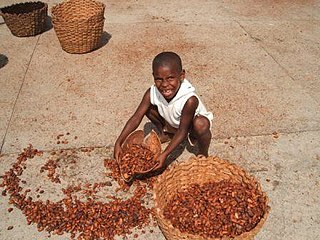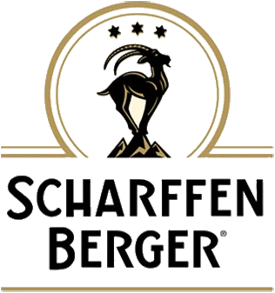
Chocolate, or cocoa, is a food made from roasted and ground cacao seed kernels that is available as a liquid, solid, or paste, either on its own or as a flavoring agent in other foods. Cacao has been consumed in some form for at least 5,300 years starting with the Mayo-Chinchipe culture in what is present-day Ecuador. Later Mesoamerican civilizations also consumed chocolate beverages before being introduced to Europe in the 16th century.

The cocoa bean or simply cocoa, also called cacao, is the dried and fully fermented seed of Theobroma cacao, the cacao tree, from which cocoa solids and cocoa butter can be extracted. Cocoa trees are native to the Amazon rainforest. They are the basis of chocolate and Mesoamerican foods including tejate, an indigenous Mexican drink.

Cadbury, formerly Cadbury's and Cadbury Schweppes, is a British multinational confectionery company owned by Mondelez International since 2010. It is the second-largest confectionery brand in the world, after Mars. Cadbury is internationally headquartered in Greater London, and operates in more than 50 countries worldwide. It is known for its Dairy Milk chocolate, the Creme Egg and Roses selection box, and many other confectionery products. One of the best-known British brands, in 2013 The Daily Telegraph named Cadbury among Britain's most successful exports.

The Hershey Company, often called just Hershey or Hershey's, is an American multinational confectionery company headquartered in Hershey, Pennsylvania, United States, which is also home to Hersheypark and Hershey's Chocolate World. The Hershey Company is one of the largest chocolate manufacturers in the world; it also manufactures baked products, such as cookies and cakes, and sells beverages like milkshakes, as well as other products. The Hershey Company was founded by Milton S. Hershey in 1894 as the Hershey Chocolate Company, originally established as a subsidiary of his Lancaster Caramel Company. The Hershey Trust Company owns a minority stake but retains a majority of the voting power within the company.

Milk chocolate is a form of solid chocolate containing cocoa, sugar and milk. It is the most consumed type of chocolate, and is used in a wide diversity of bars, tablets and other confectionery products. Milk chocolate contains smaller amounts of cocoa solids than dark chocolates do, and contains milk solids. While its taste has been key to its popularity, milk chocolate was historically promoted as a healthy food, particularly for children.

The Harkin–Engel Protocol,[A] sometimes referred to as the Cocoa Protocol, is an international agreement aimed at ending the worst forms of child labor and forced labor in the production of cocoa, the main ingredient in chocolate. The protocol was negotiated by U.S. Senator Tom Harkin and U.S. Representative Eliot Engel in response to a documentary and multiple articles in 2000 and 2001 reporting widespread child slavery and child trafficking in the production of cocoa. The protocol was signed in September 2001. Joint Statements in 2001, 2005 and 2008 and a Joint Declaration in 2010 extended the commitment to address the problem.

Scharffen Berger is an American chocolate manufacturing company, which was a subsidiary of The Hershey Company after it had been acquired in 2005. Scharffen Berger was established as an independent Berkeley, California-based chocolate maker in 1996 by sparkling wine maker John Scharffenberger and physician Robert Steinberg.

Reese's Take 5 is a candy bar that was released by The Hershey Company in December 2004. The original name of the candy bar was TAKE5 but common usage among consumers added a space. In June 2019, when the candy bar became part of the Reese's family, the name was officially changed to Reese's Take 5.
Global Exchange was founded in 1988 and is an advocacy group, human rights organization, and a 501(c)(3) organization, based in San Francisco, California, United States. The group defines its mission as, "to promote human rights and social, economic, and environmental justice around the world." Global Exchange deals with a wide range of issues, ranging from the U.S. war in Iraq to worker abuse and fair trade issues.

Military chocolate has been a part of standard United States military rations since the original D-ration bar of 1937. Today, military chocolate is issued to troops as part of basic field rations and sundry packs. Chocolate rations served two purposes: as a morale boost, and as a high-energy, pocket-sized emergency ration. Military chocolate rations are often made in special lots to military specifications for weight, size, and endurance. The majority of chocolate issued to US military personnel is produced by The Hershey Company.

Child labour is a recurring issue in cocoa production. Cote d’Ivoire and Ghana, together produce nearly 60% of the world's cocoa each year. During the 2018/19 cocoa-growing season, research commissioned by the U.S. Department of Labor was conducted by NORC at the University of Chicago in these two countries and found that 1.48 million children are engaged in hazardous work on cocoa farms including working with sharp tools and agricultural chemicals and carrying heavy loads. That number of children is significant, representing 43 percent of all children living in agricultural households in cocoa growing areas. During the same period cocoa production in Cote d’Ivoire and Ghana increased 62 percent while the prevalence of child labour in cocoa production among all agricultural households increased 14 percentage points. Attention on this subject has focused on West Africa, which collectively supplies 69% of the world's cocoa, and Côte d'Ivoire, supplying 35%, in particular.
"Big Chocolate" is a business term assigned to multi-national chocolate food producers, akin to the terms "Big Oil," "Big Pharma," and "Big Tobacco".

Hershey Creamery Company, also known as Hershey's Ice Cream, is an American creamery that produces ice cream, sorbet, sherbet, frozen yogurt, and other frozen desserts such as smoothies and frozen slab-style ice cream mixers. It was founded by Jacob Hershey and four of his brothers in 1894 and taken over by the Holder family in the 1920s. The company was one of the first to offer consumers pre-packaged ice cream pints.
Barry Callebaut AG is a Swiss-Belgian cocoa processor and chocolate manufacturer, with an average annual production of 2.3 million tonnes of cocoa & chocolate . It was created in 1996 through the merging of the French company Cacao Barry and the Belgian chocolate producer Callebaut. It is currently based in Zürich, Switzerland, and operates in over 30 countries worldwide. It was created in its present form by Klaus Johann Jacobs.

Ivory Coast leads the world in production and export of the cocoa beans used in the manufacture of chocolate, as of 2012, supplying 38% of cocoa produced in the world. West Africa collectively supplies two thirds of the world's cocoa crop, with Ivory Coast leading production at 1.8 million tonnes as of 2017, and nearby Ghana, Nigeria, Cameroon and Togo producing additional 1.55 million tonnes. Ivory Coast overtook Ghana as the world's leading producer of cocoa beans in 1978, and today is highly dependent on the crop, which accounts for 40% of national export income. The primary non-African competitor of Ivory Coast is Indonesia, which went from having almost nonexistent domestic cocoa industry in the 1970s to becoming one of the largest producers in the market by the early 2000s. According to the UN FAO, Indonesia overtook Ghana and became the second-largest producer worldwide in 2006. The World Cocoa Foundation provides significantly lower figures for Indonesia, but concurs that it is the largest producer of cocoa beans outside of West Africa. Large chocolate producers such as Cadbury, Hershey's, and Nestle buy Ivorian cocoa futures and options through Euronext whereby world prices are set.
This article addresses various criticisms of Cargill Inc, a privately held agribusiness multinational giant with operations in 70 countries and its headquarters in Minneapolis, Minnesota, in the United States. Cargill Inc has been owned by the Cargill family for 154 years. It is the largest privately owned corporation in the United States, with an annual revenue of $113.5 billion in 2019.

Fair trade cocoa is an agricultural product harvested from a cocoa tree using a certified process which is followed by cocoa farmers, buyers, and chocolate manufacturers, and is designed to create sustainable incomes for farmers and their families. Companies that use fair trade certified cocoa to create products can advertise that they are contributing to social, economic, and environmental sustainability in agriculture.
Mondelez International, Inc., styled as Mondelēz International, is an American multinational confectionery, food, holding, beverage and snack food company based in Chicago. Mondelez has an annual revenue of about $26.5 billion and operates in approximately 160 countries. It ranked No. 108 in the 2021 Fortune 500 list of the largest United States corporations by total revenue.
The World Cocoa Foundation is a non-profit membership organization with more than 90 member companies striving to make the cocoa supply chain more sustainable. WCF and its members are criticized for doing too little to end child labor, deforestation and extreme poverty, with their efforts dismissed as “greenwashing” and “a remarkable failure”. WCF's membership includes chocolate manufacturers such as Mondelez International, Nestlé, The Hershey Company and Mars, Inc. cocoa producers and suppliers such as Barry Callebaut and Cargill, shipping companies and ports and retailers such as Starbucks.

Organic chocolate is chocolate which has been certified organic. As of 2016, it was a growing sector in the global chocolate industry. Organic chocolate is a socially desirable product for some consumers. Major brands, such as The Hershey Company, have begun to produce organic chocolate.












